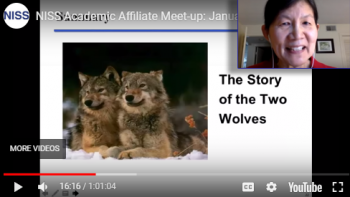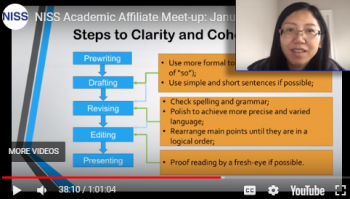

On Tuesday, January 29th NISS Affiliates gathered to listen to two experienced and distinguished individuals talk about their experience and advice about ways to go about improving how they go about communicating statistical information.
The first speaker was Christy Chuang-Stein. Her experience speaks for itself. She is a Fellow of the American Statistical Association (ASA) with more than 160 peer-reviewed scientific publications/book chapters and 3 books. Dr. Chuang-Stein received ASA’s Founders’ Award in 2012 and the Distinguished Achievement Award of the International Chinese Statistical Association in 2014. She retired from Pfizer as Vice President and Head of the Statistical Research and Consulting Center in July 2015 after 30 years in the pharmaceutical industry and 5 years in academia (University of Rochester) and is now the owner and Principal Consultant of Chuang-Stein Consulting, LLC. Christy currently chairs NISS’ Affiliates Committee.
Christy's focus was on oral communication and presentation skills. She started out by getting participants to think about the type of communicator they and their audience is, and use this knowledge to prepare the message. Her optimism and positivity was clearly reflected in her personal remarks. She cautioned listeners to stay away from 'communication traps'. As for presentation skills, Christy pointed out some common characteristics of good presentations. Christy used the 'Story of the Two Wolves' to make it clear that the way to good communication and presentation is to ‘Just Do It’. As she stated, "There is no elevator to success - you have to take the stairs!"
The second speaker was Limin Peng of Emory University. She currently serves as Associate Editor for the Journal of American of Statistical Association and Biometrics. Dr. Peng was elected as a Fellow of the American Statistical Association in 2016 and received the American Public Health Association Mortimer Spiegelman Award in 2017. Her remarks focused on improving writing skills. Reports, papers, applications, grants all fall into this category.
"The most important aspects for all writing are clarity as well as coherence. Adapting your writing to the potential readers and the purpose can help more effectively transform information from your writing to readers."
Limin Peng, Emory University
And, while a limited vocabulary or a lack of natural sense of language for English might be barriers for some non-native speakers, Limin provided tips for getting around these. Foremost she asked her listeners not to just automatically adopt feedback but to go through these comments carefully to learn and reflect on why these changes should be considered. Limin also listed a number of helpful resources for writers.
Questions were posed by participants and the moderator, Mimi Kim (Albert Einstein University). When Christy was asked for advice on how non-English-speaking individuals could improve their English, she drew from her own experience and shared an approach suggested by one of her past managers – regularly make a list of individuals or colleagues with whom to have a coffee break or lunch.
"Language, the more we use it, the better we get at it!"
Christy Chuang-Stein, Chuang-Stein Consulting, LLC
When Limin was asked, "As the editor of a journal, how does the quality of the writing affect the acceptance of the paper? If a paper is innovative and have technical detail but is poorly written, what is your reaction?" Limin responded that "poor writing will give a poor impression and if the paper is 'on the boundary', it will likely be rejected. Furthermore, even if the idea is very creative, poor writing will still have a negative impact. Reviewers often do not read papers line by line but read quickly to get the idea. If you are not clear and organized, so that your ideas are easily understandable, reviewers are likely to reject."
Review the entire conversation by viewing the recording of this session below!
Mark your calendars! The next Academic Meet-up is scheduled for the last week in April and will focus on career paths within academic departments, "Succeeding as a Statistician in Academic: Things I Wish I Knew at the Start of My Career".
Up to date information about this session and how to register will be posted on the NISS website.
